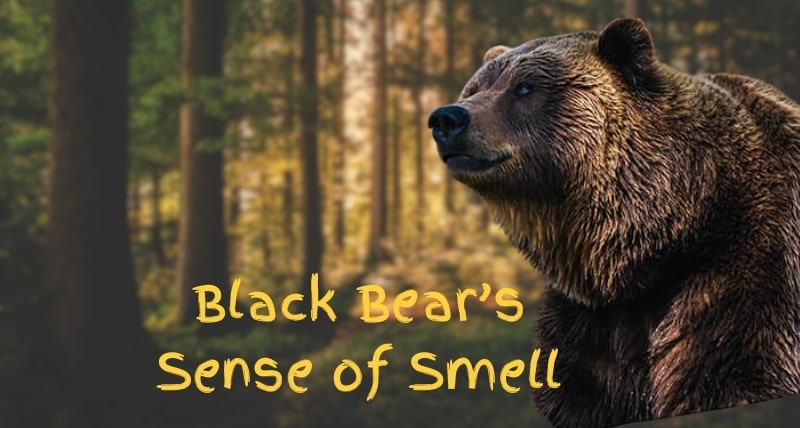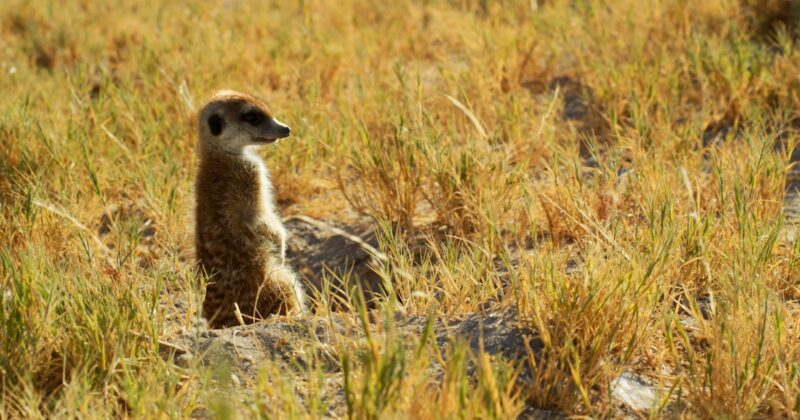Black bears are one of the most fascinating and adaptable creatures on earth (and terrifying, if you ask me). From the frosty regions of Canada to the sultry landscapes of Mexico, they are as versatile as they are captivating. But beyond their majestic presence and physical prowess, they boast a sensory ability that astounds researchers and enthusiasts alike: their powerful sense of smell.
A black bear’s world is defined not just by what it sees or hears, but predominantly by what it smells. From interpreting the nuanced signals in the scent markings of other bears to tracking the rich aroma of ripe berries or the tantalizing smell of honey, they rely heavily on their olfactory skills.
Sense of Smell
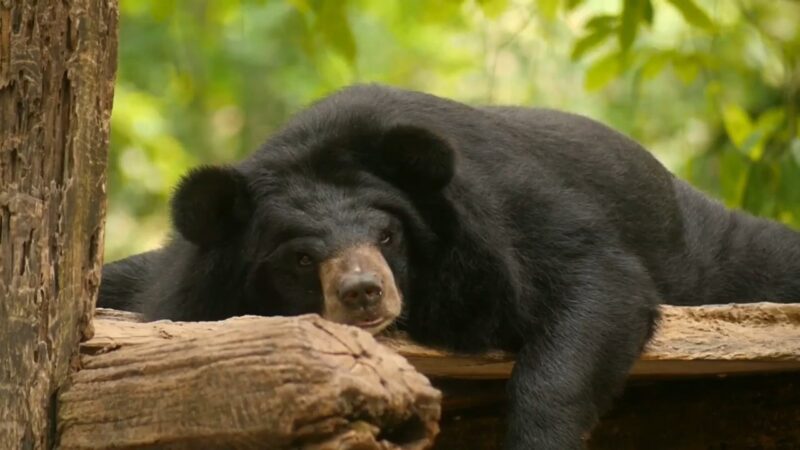
Black bears possess an olfactory acuity far surpassing that of humans and many other animals. This remarkable sense of smell helps them to detect danger, find food, locate mates, and make sense of the world around them. Their keen noses act as powerful sensors, constantly sampling the air for information. Every waft of the wind brings new data, each more revealing than the last.
From the presence of a rival to a hidden stash of food or a human intruder, their sense of smell provides them with a near-constant stream of valuable information.
Despite the complexity of this sensory process, they interpret scents with seeming ease, converting the kaleidoscope of smells that fills their nostrils into useful, actionable information. This remarkable ability to understand and respond to the world through smell is a testament to their adaptability and survival skills.
Comparison to Other Animals?
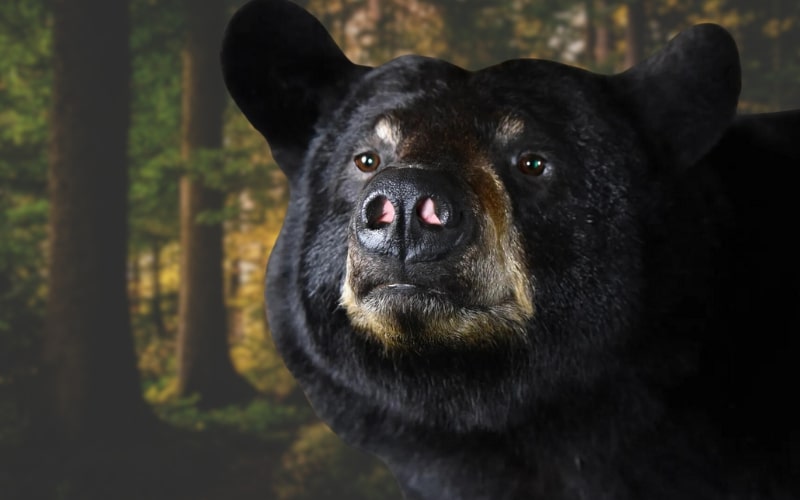
Black bears are often cited as having one of the strongest senses of smell in the animal kingdom. But how does their olfactory prowess stack up against other well-known sniffers?
Researchers estimate that a black bear’s sense of smell is seven times better than that of a bloodhound and potentially hundreds of times greater than a human’s. This makes them one of the most powerful scent detectors in the natural world.
Many factors contribute to their extraordinary olfactory abilities. For instance, they have a highly developed and specialized nose structure, containing an exceptionally large number of scent receptors.
These receptors allow them to detect and interpret a wide variety of scents, from the faint aroma of a buried carcass to the complex odor bouquet of other bears. In addition, they have a large olfactory bulb – the part of the brain responsible for processing scent information. This not only enhances their ability to detect scents but also their capacity to remember them, enabling them to recall the location of food sources or the scent trails of potential mates.
Anatomy of a Scent Expert
The power of a black bear’s nose lies in its complex and specialized structure. Their noses are far larger and more convoluted than ours, with a far higher density of scent receptors. Their internal structure is a labyrinth of bony and soft tissue structures, which increases the surface area available for scent detection.
These anatomical features allow them to pick up a wide range of scents, even those that would be undetectable to other animals. Their ability to interpret these scents, to discern the story each smell is telling, sets them apart as true olfactory experts.
This expertise extends to their ability to remember scents. Black bears have exceptional memories, particularly when it comes to smells. This enables them to remember the location of food sources based on smell alone, a vital skill when it comes to surviving in the wild.
The Science Behind the Sniff
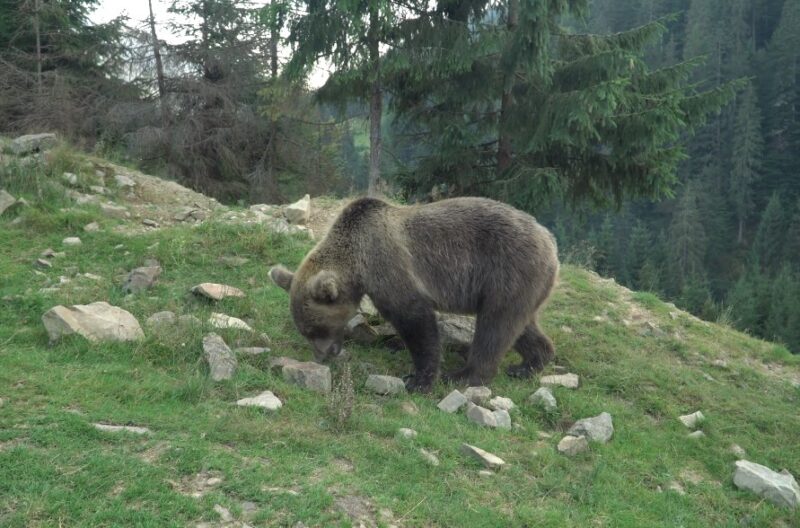
So how exactly does a black bear’s nose work? Like other mammals, they rely on a complex system of olfactory receptors and neural pathways to detect and interpret scents. When an odor molecule enters its nose, it binds to one of these receptors, triggering an electrical signal that is sent to the brain.
In the brain, this electrical signal is interpreted as a specific smell. Each smell has its unique signature, allowing the bear to distinguish between a wide variety of scents. This system is incredibly sensitive, capable of detecting even the faintest odors.
But a bear’s olfactory system isn’t just about sensitivity; it’s also about interpretation. They can interpret a complex range of scents, enabling them to glean valuable information from the world around them. This capacity for scent interpretation, combined with their exceptional memory, makes them masterful scent detectives.
They have also evolved a number of behaviors that maximize their use of this powerful sense. They’re often observed standing on their hind legs, sniffing the air. This position elevates their nose, allowing them to catch scent molecules carried on the breeze.
The Physiology of Olfaction
Their olfactory system is complex and specialized. The process begins when odor molecules enter the bear’s nostrils and make contact with the mucous membrane. This membrane is filled with olfactory receptors, which can detect and bind to specific odor molecules.
Once an odor molecule binds to a receptor, it triggers a series of chemical reactions that generate an electrical signal. This signal travels along the olfactory nerve to the olfactory bulb, a part of the brain that is dedicated to processing scent information. The olfactory bulb decodes the signal, interpreting it as a specific smell.
This information is then relayed to other parts of the brain, where it can influence the bear’s behavior. For example, the scent of ripe berries might trigger it to forage, while the scent of a predator could cause it to flee.
Record-Breaking Sniffers
The distance over which a black bear can detect a scent depends on several factors, including the strength of the odor, wind direction, humidity, and temperature. Under ideal conditions, a black bear can detect the scent of a food source from over a mile away.
These impressive scent-detection abilities make black bears master foragers. They can sniff out the ripest berries, locate carrion hidden deep within the forest, and even detect the faintest trace of honey within a bee’s nest.
When in the Wild…
In the wild, a black bear’s sense of smell is its most crucial navigational tool. They use their extraordinary noses to locate food, detect danger, and find mates. Even the seemingly insignificant scents provide valuable information to these skilled smell detectives, guiding their decisions and behaviors.
When foraging, they rely heavily on their sense of smell to locate food.
But it’s not just about food. They also use their powerful noses to detect danger. The scent of a predator or a larger, more dominant bear can alert them to potential threats, allowing them to avoid dangerous situations.
Similarly, the scent of humans can warn them of our presence, often prompting them to retreat.
Hunting, Foraging, and Navigating with Precision
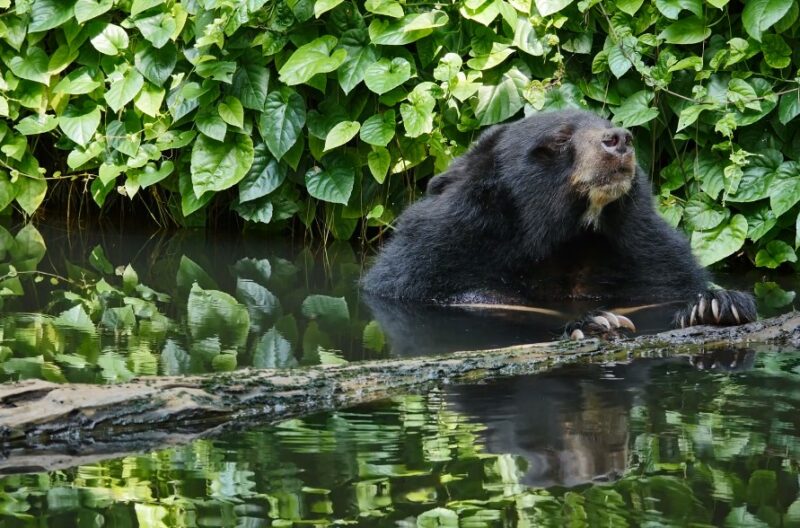
The black bear is an omnivore, feeding on a wide variety of food sources. Hunting for food is a multi-step process for them, and their noses play a crucial role at every stage. When a bear first catches the scent of a potential meal, it will stand on its hind legs to get a better sniff. By doing so, it can determine the direction of the scent and estimate how far away the food source is.
Once the bear has a scent lock, it will begin to track the smell. It does this by moving in the direction of the scent while continuing to sniff the air. If the smell gets stronger, the bear knows it’s moving in the right direction. If the smell gets weaker, it will change course.
The Hidden Secrets
The hidden secrets of a black bear’s sense of smell lie in the intricate subtleties it can detect and interpret. Beyond identifying food sources and potential dangers, black bears use their olfactory prowess to communicate and understand the world around them.
Scent-marking is a common behavior in them, and it serves several important functions. It can denote territory, signal reproductive status, or communicate dominance. When a bear comes across another bear’s scent mark, it can glean a wealth of information about the individual who left it.
They also use their sense of smell to find mates. During the breeding season, male species can detect the pheromones released by females in heat. This olfactory cue triggers a strong urge to find the female and mate, ensuring the continuation of their species.
Scent and Survival

Smell plays a crucial role in their survival strategies. In fact, the black bear’s extraordinary olfactory abilities have likely played a significant role in the species’ success and wide distribution. Food is a critical factor in black bear survival, particularly in preparation for hibernation. The ability to sniff out food is crucial in the late summer and fall when they enter a phase called hyperphagia, where they dramatically increase their calorie intake to prepare for winter hibernation.
Their nose also helps it avoid potential dangers. The scent of other bears or predators can alert a black bear to a threat, giving it time to flee or hide. Moreover, the smell of humans is often a signal for them to retreat, helping to reduce conflicts.
Smell and Seasonal Behavior
A black bear’s sense of smell influences its behavior throughout the year, particularly during the key periods of hibernation and the mating season. As the seasons change, so too do the smells that fill its environment, triggering various behaviors. In the fall, the smell of ripe fruits and nuts stimulates foraging behavior as bears prepare for hibernation. During hibernation, their metabolic processes slow down, but they can still wake up if disturbed.
The scent of an intruder, for example, can rouse a bear from its winter slumber. In the spring, smells play a crucial role in their mating season. Males can detect the pheromones of a receptive female miles away and will follow the scent to find a mate. Females, too, can use their sense of smell to evaluate potential mates, selecting the ones whose scent signals good health and genetic compatibility.
The Human-Bear Connection
Black bears are highly adapted to their natural habitats, but they can also adapt to human-inhabited areas due to their intelligence and exceptional sense of smell.
As human activity encroaches on their territories, black bears may be attracted by the smell of food in our trash cans, compost piles, or even the scent of food cooking in our homes. This overlap can lead to more frequent encounters between humans and bears.
Often, bears that come into human-occupied areas in search of food become habituated to the presence of people, potentially leading to dangerous situations.
Thus, understanding a bear’s acute sense of smell and taking steps to control odors can play a crucial role in minimizing these conflicts. For example, securing garbage in bear-resistant containers, cleaning barbecues after use, and not leaving pet food outside can help to deter bears from approaching human-inhabited areas. In more rural or bear-populated areas, electric fences can be used to protect vegetable gardens, compost piles, beehives, and other potential food sources.
And remember, feeding bears is not only dangerous but also illegal in many places because it encourages them to associate humans with food. By reducing the smells that attract them, we can coexist more peacefully with these incredible creatures.
FAQs:
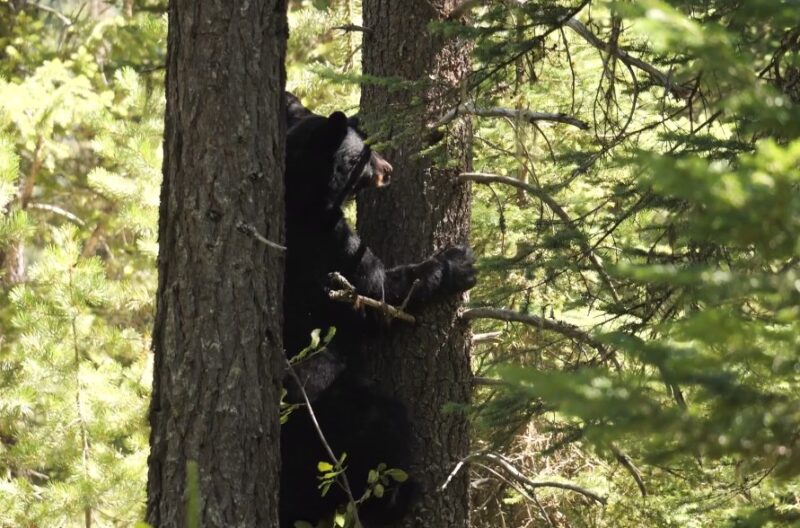
Can a black bear smell a human from inside a vehicle?
Yes, it can, although the scent may be somewhat masked by the vehicle’s structure.
How does a black bear’s sense of smell compare to that of other bear species?
They have a similar sense of smell to other species, such as grizzly bears, as both rely on their acute sense of smell for survival.
Can a black bear’s sense of smell be compromised by human activities?
Yes, human activities such as pollution or strong artificial odors can interfere with its sense of smell and affect their behavior.
Can a black bear detect the smell of garbage from a distance?
Yes, they can and that often leads to human-wildlife conflicts.
Can a black bear smell fear in humans?
While black bears can detect various scents, including pheromones and changes in body odor, it is unclear whether they can specifically smell fear in humans.
Conclusion
In conclusion, black bears have one of the most powerful senses of smell in the animal kingdom. Their remarkable olfactory abilities play a crucial role in almost every aspect of their lives, from finding food and avoiding danger to locating mates and communicating with each other. The intricate world of scents that black bears perceive is beyond our human understanding.
Yet, through scientific research and observation, we have been able to glean fascinating insights into their olfactory world. These insights not only increase our appreciation of these magnificent creatures but also help us better coexist with them.
Through our growing understanding of black bears and their powerful noses, we are reminded of the importance of every creature’s role in the ecosystem and the need for our continued efforts to conserve and respect the natural world.
Related Posts:
- What Do Black Bears Eat? Insights into Their Diet
- How Fast Can A Black Bear Run? Surprising Swiftness Revealed
- What Biome Do Grizzly Bears Live In? Into the Great…
- How to Layer a Compost Bin: Transform Your Waste into Gold
- Why Do Meerkats Stand Up? - Insights into Their…
- Where Can You See Black Bears In America?


